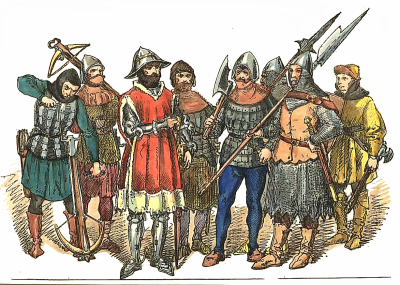The Peace of Thorn or Toru of 1466, also known as the Second Peace of Thorn or Toru (Polish: drugi pokj toruski; German: Zweiter Friede von Thorn), was a peace treaty signed in the Hanseatic city of Thorn (Toru) on 19 October 1466 between the Polish king Casimir IV Jagiellon and the Teutonic Knights, which ended the Thirteen Years' War, the longest of the PolishTeutonic Wars.
The treaty was signed in the Artus Court, and afterward a mass was held in the Gothic Franciscan Church of the Assumption of the Blessed Virgin Mary to celebrate the peace treaty.
The Thirteen Years' War (German: Dreizehnjähriger Krieg; Polish: wojna trzynastoletnia), also called the War of the Cities, was a conflict fought in 1454–1466 between the Prussian Confederation, allied with the Crown of the Kingdom of Poland, and the State of the Teutonic Order.
The war began as an uprising by Prussian cities and local nobility to win independence from the Teutonic Knights. In 1454 Casimir IV married Elisabeth of Habsburg and the Prussian Confederation asked Poland's King Casimir IV Jagiellon for help and offered to accept the king as protector instead of the Teutonic Order. When the King assented, war broke out between supporters of the Prussian Confederation, backed by Poland, and backers of government by the Teutonic Knights.
The Thirteen Years' War ended in the victory of the Prussian Confederation and Poland and in the Second Peace of Thorn (1466). This was soon followed by the War of the Priests (1467–1479), a drawn-out dispute over the independence of the Prussian Prince-Bishopric of Warmia (Ermland), in which the Knights also sought revision of the Peace of Thorn.

 English
English  español
español  français
français  português
português  русский
русский  العربية
العربية  简体中文
简体中文 
